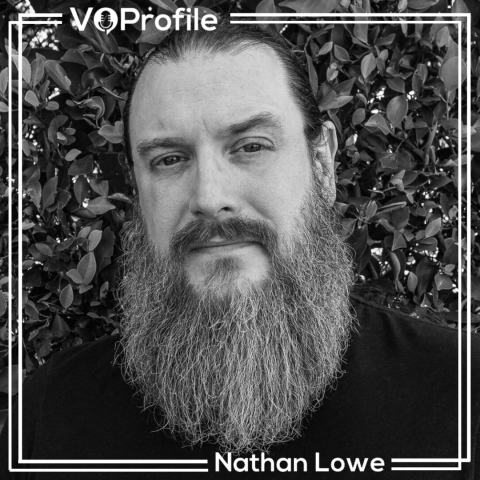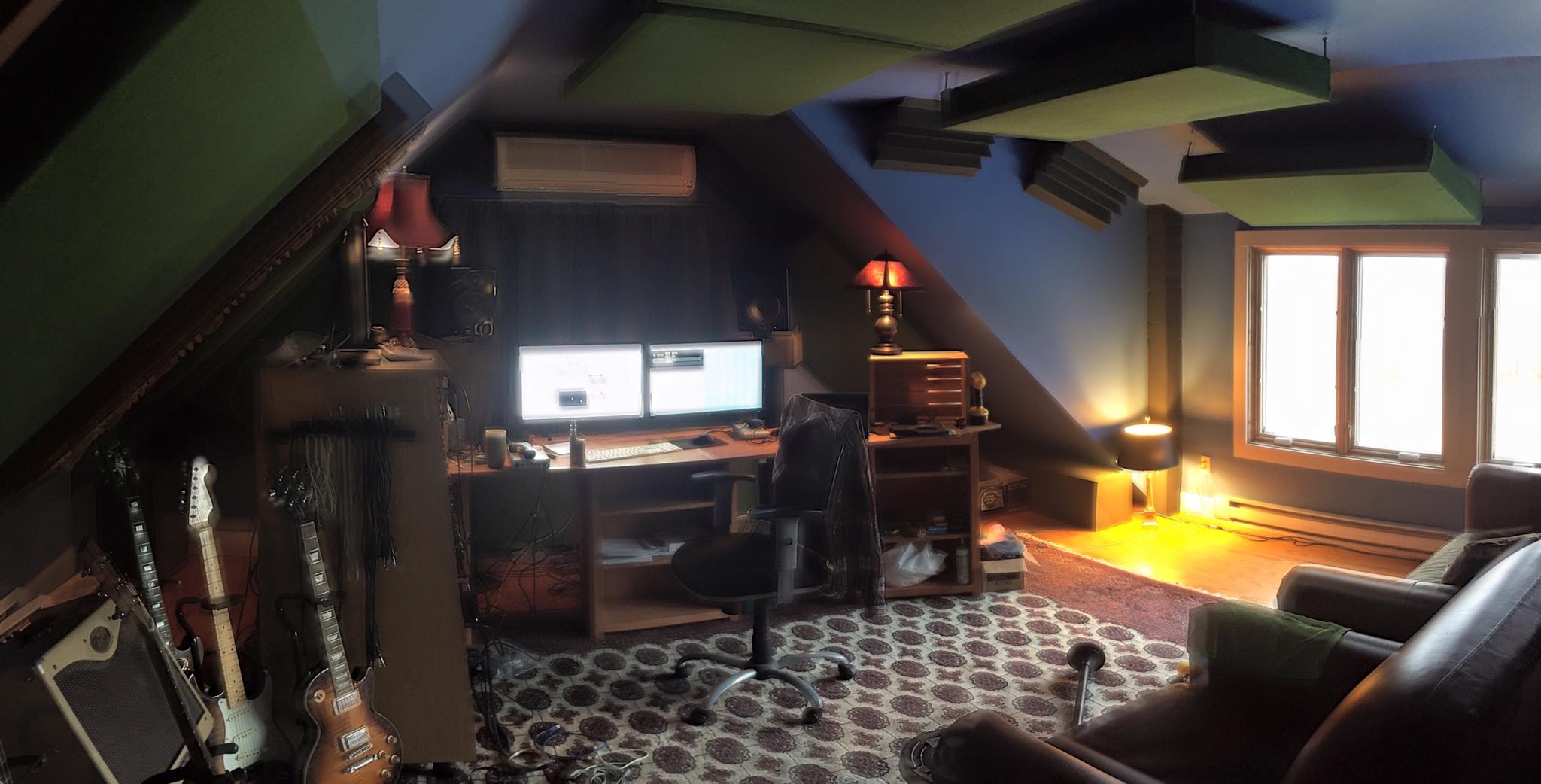
Q&A With Voice Actor Nathan Lowe
Nathan Lowe: Voice actor. Musician. Studio owner. Beardist. Yes, Nathan Lowe is a man of many talents and interests, and an esteemed member of the VOPlanet VO Team. Nathan took time to chat with us about his voice over journey and gave us insight into his storied career. Sit back, relax and wrap your mind around all things Nathan Lowe.
You started you voice over career in 1999. Happy 20th anniversary!
Thanks! It’s been quite a ride!
How did you get started in voice overs?
I have always been fascinated with accents and voices. I am sure my parents regretted buying me a record player when I was little – I woke them up at 5:30 every morning wearing out Disney records. I played them over and over again, really lost in the characters and performances. I was stuck with the bug – trying to repeat and imitate everybody around me (also much to my mom’s chagrin, I’m sure!) – from then on. I never contemplated doing this sort of work for a living(!) until grad school, when my partner suggested I make a go of it. She was in some ways my biggest push – until then, it was just something I did; with her encouragement, I started in University radio and then at a local AM station. It went on from there when I built my first home studio in 2003. Thank you, Mia!
You went to college on a music scholarship. How has your musical training influenced your voice over career?
I did. I had sung in church choirs since I was young, and have played music off and on since I was really young. Singing in college was a natural continuation for me. Your question about musical training is a really great one – to me, copy has just as much rhythm as a piece of music, even :30 of legal crammed into :10 at the end of a spot. Finding the beats in a piece is really important, in my experience, and thinking of things musically is immensely helpful with that. Also, singing in a choir – and being part of bands – I think is extremely beneficial in learning how to take, and accept with grace, line readings. The director – whether choir, band, or booth – has a particular vision (or should I say sound) in mind. It’s great to be able to improv and there is certainly a very important place for that – having that in your arsenal is key. But so is being able to quickly, competently replicate and nail what is asked of you. I have no problem with a line reading; if it gets the job done quickly, and they love the result, I’ve done my job.
In addition, having a background in music (both as a player and an engineer) helps me in the editing process as well; being a critical listener is so important in editing: eliminating breaths while preserving the tempo of the piece of copy is but one example of this. Nothing is worse than a cut-off breath that is too clipped, or is not faded correctly. These are small things, but they can add up to something not sounding quite right, even if the listener can not put her/his finger on what it is.
What role does music play in your life today?
I worked with a friend of mine here in LA as a producer, recording and mix engineer, as well as playing keyboards, drum programming, guitar, and vox – both lead and BG – for several years. There was a time when I had hung my shingle out as an AE for music and post production, but I decided a couple years ago to focus my studio life exclusively on VO work. If someone I knew wanted me to work on a music project I certainly would – and still do from time to time – but I don’t actively seek it out anymore. I still listen to music a lot…
You worked in radio in LA, What did you do in radio? Did radio influence your VO career?
I was a board Op and did promo production at KFI here in LA. Before that, I board-opped as well as voiced and produced in-house spots for an AM station I worked at in South Carolina, and also hosted a talk show and DJ’d for our University’s radio station, prior to moving out here in 2000.
Radio definitely influenced my career. One of the biggest things was learning early what it’s like to be on both sides of the glass. To my mind, the title “voice actor” is a bit of a misnomer for today’s industry. With so much being done out of home studios, the modern VA is much more than that. Gone (for the most part) are the days where the talent just shows up at a studio, cuts some spots, then leaves. Talent today must be able to build their own studio/booth (and understand what they’ve built!), be their own mix engineer while also performing, direct themselves when needed (and coordinate remote supervised sessions as well), be competent with editing software, be able to manage their studio – including troubleshooting, hardware/software/computer management, and be able to do all this quickly. Nothing teaches you those skills in quite the way that helming a 50,000 watt blowtorch live with no room for mistakes does. I wore a lot of hats at the same time at those stations, and that experience has been invaluable for me in today’s industry.
What advice would you give to radio folks that want to crossover to voice over?
Don’t fret that you won’t be able to learn the differences between reading on-air copy, in-house promos, announcing traffic or hosting a show, and VO for commercials or narration or explainers. Or listen to those voices that say you can’t do this work. There is definitely a learning curve – there was a TON of stuff I had to unlearn making the transition between the two. One of the first things I did on coming out here was to get coaching. I have to thank Nancy Wolfson, Bill Holmes, Bill Applebaum, Marc Graue, Roger Scott, and others for those initial years of training to help in the transition. But one of many things ‘radio people’ have in their pockets is a good feel for time, especially on-air talent. One gets a sense really quickly of how long 10 seconds is, and how long 30 is, and everything in between and beyond – booth directors and clients will love you for it. Radio people can be much more comfortable with ‘cans’, which are really needed in a lot of home studio setups, as well as multitasking – watching monitors and checking levels while still being able to deliver a good performance, while taking cues from others at the same time. Will you need training to overcome a “wild wacky morning crew” sound? Yup. But it can be done. Know that you need some re-training, but also know you have a ton of skills already.
You own humpbackmedia studios. Tell us a little bit about what humpbackmedia has to offer.
I offer my own voice services, of course – both raw and final production audio – as well as the ability for others to come in to record as well. I am a trained audio engineer, having both studied at and worked for music schools here in LA, building out and maintaining classrooms and studios for both. This experience, as well as my technical experience in radio, went into my home studio(s). My room is as purpose-built and tuned as possible given our home’s construction, with a separate booth and control room, powered by Universal Audio and Pro Tools. As I mentioned above, I can offer music mixing services, as well as post-production audio and spot production. I have Source Connect Pro, a modest but high quality mic collection, instruments, and – while the LA room is not currently set up with a separate tracking room – I can record/mix/produce singer-songwriter/acoustic performers.

You have locations in LA and Rhode Island. Do you split your time between the two locations?
We try to. My partner’s mom lives with us now, but still owns a wonderful place in a small town in RI called Little Compton (settled 1659, population right at 4000). We ‘ran away’ to live there for a couple years and came back to LA in 2017 (it was our mid-life crisis). While there I was lucky enough to build out a full studio in an unused art studio space, where all my more esoteric outboard gear still lives. When we moved back – since I was going to work exclusively in the VO realm – I brought back just enough for that work. We try our best to spend time in both places – we are unbelievably fortunate in that regard. Oh, and while we were there, we loved telling our friends here in LA that we were Straight Outta Little Compton…
What’s the difference between the two? Do you prefer the business of LA or the quiet of Rhode Island?
Well, night and day! A bad day in Little Compton is getting drawn butter on your chinos while eating fresh-from-the-sea lobster on your deck watching deer go through your field. Seriously though, it’s a toss up in some ways – one cannot beat the quiet of the area. Boston and Providence are a REAL 45 minute or hour and 15 minute drive to wonderful history and culture, not a 10-to-the-405-to-the-101 hour and 15 minutes… On the other hand, I would have killed for a real taco by the time we moved back. LA is wonderful in so many ways – especially for personal business growth. So many opportunities to be part of VO workout groups, close to training, studios, things like that. So we love both places!
Today you are a full-time professional voice actor. Do you have a favorite genre of voice over?
Oooo. Hard question. I’ve done a bunch of different things – radio/TV ads, explainers, English dubbing, a couple audio books (not my fav), award shows, some video games… It’s tough to say a particular genre is a favorite. I think each has its own challenges that are fun to get on the inside of. I think things that give me a chance to develop a real character are my favorite. For example, I loved having the privilege of being the Disembodied British Voice for 42 episodes of a series called “8-bit Philosophy” for the YouTube creator, Wisecrack. We tackled philosophical problems/topics through the lens of classic 8-bit video games. Not only did it touch my heart (I was initially going to stay in academia in philosophy until I ran off to join the [VO]circus), but the creators let me develop this over-the-top, David Attenborough meets Stephen Fry meets The Stanley Parable narrator. It was wonderful.
Word on the street is you recently attended a Whitesnake concert. Do you prefer their heavier work or their silky metal ballads?
Wait. Are you following me? Illuminati. Confirmed. Well, you can’t beat Still of the Night, but who can forget Is this Love?
Any other musical interests you care to divulge?
An abiding interest in Russian Basso Profundo church choirs, Tuvan throat singing, and all sorts of odd and little known folk musical traditions, when I’m not trying to complete my rare Japanese Imports Whitesnake collection on 200g vinyl. Anybody got a copy of Lovehunter? PM me.
Listen to Nathan's voice over demos and hire him direct at: VOPlanet.com/Nathan-Lowe. VOPlanet.com offers free voice over casting to professional voice actors. Post jobs for free and work directly with the industry's best voice talent.




 VOPlanet Blog
VOPlanet Blog